
Cardiac Failure Review
Scope & Guideline
Exploring breakthroughs in cardiac failure management.
Introduction
Aims and Scopes
- Heart Failure Management and Therapy:
The journal emphasizes the latest developments in the management and therapeutic approaches to heart failure, including pharmacological treatments, device therapies, and patient education. - Diagnostic Imaging and Biomarkers:
A significant focus is placed on advancements in diagnostic imaging techniques and the identification of biomarkers that aid in the early detection, prognosis, and management of heart failure. - Epidemiology and Public Health:
Research published in the journal often addresses the epidemiological aspects of heart failure, including its global burden, demographic variations, and the impact of socioeconomic factors on patient outcomes. - Multidisciplinary Approaches to Heart Failure Care:
The journal highlights the importance of a multidisciplinary approach in heart failure management, integrating insights from cardiology, nursing, pharmacy, and public health. - Emerging Therapies and Technologies:
Innovations in treatment modalities, such as telemedicine and remote monitoring technologies, are explored to enhance patient management and outcomes.
Trending and Emerging
- Heart Failure with Preserved Ejection Fraction (HFpEF):
Research on HFpEF has surged, focusing on its unique challenges, treatment strategies, and the importance of this condition in the broader context of heart failure management. - Telemedicine and Remote Monitoring:
The integration of telemedicine and remote patient monitoring technologies has become increasingly prominent, particularly in light of the COVID-19 pandemic, emphasizing the need for innovative care solutions. - Diversity and Health Disparities:
There is a growing emphasis on understanding and addressing health disparities in heart failure care, particularly among minority populations, highlighting the importance of equitable healthcare access. - Biomarkers and Personalized Medicine:
The exploration of biomarkers for early detection and personalized treatment strategies is on the rise, reflecting a shift towards tailored therapy based on individual patient profiles. - Multimodality Imaging:
The use of multimodality imaging techniques to enhance diagnosis and treatment planning in heart failure is emerging as a critical theme, showcasing advancements in imaging technologies.
Declining or Waning
- Traditional Pharmacotherapy:
While traditional pharmacotherapy for heart failure remains important, there has been a noticeable decline in articles focused on older classes of medications, as newer therapies and treatment strategies gain prominence. - Basic Pathophysiological Studies:
Research centered on basic pathophysiological mechanisms of heart failure has decreased, possibly due to a growing emphasis on clinical applications and translational research. - Generalized Management Guidelines:
Publications that reiterate general heart failure management guidelines without new insights or data have diminished, as the field moves towards more personalized and patient-specific treatment approaches.
Similar Journals
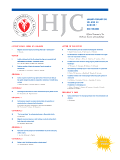
Hellenic Journal of Cardiology
Elevating Cardiovascular Science with Open Access ExcellenceThe Hellenic Journal of Cardiology, a peer-reviewed open-access publication under the esteemed ELSEVIER banner, proudly represents the forefront of research in the field of Cardiology and Cardiovascular Medicine. Established in 1993 and actively publishing since then, this journal has carved a niche in disseminating high-quality research and clinical insights relevant to cardiovascular health in Greece and beyond. With an impressive Q2 ranking in both Cardiology and Cardiovascular Medicine categories as of 2023, the journal holds a commendable position at Rank #126/387 in Scopus, indicative of its critical role in advancing scientific knowledge and practice. The Hellenic Journal of Cardiology transitioned to open access in 2016, ensuring that ground-breaking research is freely accessible, fostering a global dialogue among researchers, clinicians, and students alike. Its publication frequency spans significant years, providing a continuous flow of innovative findings while addressing pressing cardiovascular issues. As the journal builds on its legacy, it aspires to enrich the academic community's understanding of cardiovascular medicine, making it an invaluable resource for anyone invested in heart health.
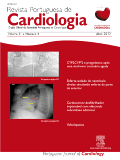
Revista Portuguesa de Cardiologia
Empowering the fight against heart disease through open access research.Revista Portuguesa de Cardiologia, published by Elsevier España SLU, stands as a pivotal resource in the realm of Cardiology and Cardiovascular Medicine. With its origins tracing back to 1970, this journal has cultivated a robust academic presence, achieving a 2023 Q3 ranking in its category, and currently holding a position of #220 out of 387 on the Scopus rankings, placing it within the 43rd percentile of its field. This open access journal, available since 2011, aims to disseminate high-quality research and insights relevant to contemporary cardiovascular issues. Its commitment to accessibility and knowledge exchange enhances its importance for clinicians, researchers, and students alike, fostering a more informed community in the fight against cardiovascular diseases. Operating from its base in Barcelona, Spain, the journal welcomes contributions that further the understanding and treatment of heart conditions, contributing significantly to the advancement of cardiovascular health.
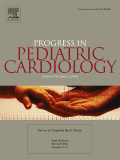
PROGRESS IN PEDIATRIC CARDIOLOGY
Transforming Pediatric Cardiology Through Rigorous ResearchPROGRESS IN PEDIATRIC CARDIOLOGY is a notable journal dedicated to advancing research and knowledge in the fields of pediatric cardiology and cardiovascular health in children. Published by Elsevier Ireland Ltd, this journal serves as a vital resource for clinicians, researchers, and healthcare professionals who engage with the complexities of heart diseases affecting pediatric populations. With ISSN 1058-9813 for print and 1558-1519 for online issues, it operates from Ireland and reflects a commitment to disseminating high-quality, peer-reviewed research since its inception in 1992. The journal is ranked in the Q3 category in both cardiology and pediatrics, indicating its relevance in the academic community, despite recent performance metrics showing room for growth within the competitive landscape. Researchers and practitioners can expect to find cutting-edge findings and clinical studies that aim to improve outcomes in pediatric cardiology. While it does not offer Open Access, the breadth of research covers various critical aspects, contributing significantly to the field's ongoing development.
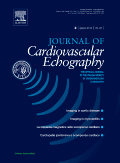
Journal of Cardiovascular Echography
Empowering researchers with the latest in cardiology.Journal of Cardiovascular Echography, published by WOLTERS KLUWER MEDKNOW PUBLICATIONS, serves as a premier platform for global researchers, medical professionals, and students dedicated to the ever-evolving fields of cardiology and cardiovascular imaging. With the ISSN 2211-4122 and E-ISSN 2347-193X, this journal provides access to cutting-edge research from 2011 to 2024, offering insights into the latest advancements in echocardiographic techniques and their clinical applications. Despite its current classification in the Q3 quartile within both Cardiology and Cardiovascular Medicine as well as Radiology, Nuclear Medicine, and Imaging, it continues to make meaningful contributions to the academic community, ranking 234th in the Scopus category for Radiology and 278th in Cardiology. The Journal of Cardiovascular Echography is committed to furthering knowledge and fostering collaboration among researchers by sharing critical developments in the field, making it an essential resource for anyone looking to stay abreast of transformational changes in cardiovascular diagnostics.
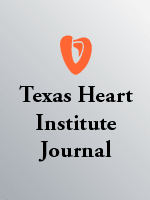
TEXAS HEART INSTITUTE JOURNAL
Illuminating the Future of Cardiovascular Medicine.TEXAS HEART INSTITUTE JOURNAL, published by the renowned Texas Heart Institute, stands as a pivotal resource in the field of cardiology and cardiovascular medicine. With a history spanning over four decades since its establishment in 1982, this journal addresses a wide range of topics within its scope, including clinical studies, innovative treatments, and groundbreaking research in heart health. Despite its Q3 ranking in both Cardiology and Cardiovascular Medicine, the journal is committed to fostering advancement in medical knowledge and practice, providing an essential platform for healthcare professionals and researchers alike. While currently lacking open access, the journal is recognized for its contributions to the field, aiming to illuminate critical healthcare discussions and promote the exchange of ideas. For those interested in staying at the forefront of cardiovascular research, TEXAS HEART INSTITUTE JOURNAL offers invaluable insights and the latest developments shaping the future of heart care.
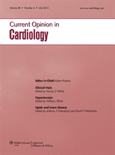
CURRENT OPINION IN CARDIOLOGY
Navigating the latest trends in cardiovascular medicine.CURRENT OPINION IN CARDIOLOGY, published by LIPPINCOTT WILLIAMS & WILKINS, is an esteemed journal in the field of cardiology that has been serving the academic community since 1988. With a robust focus on the latest developments and emerging trends in cardiovascular medicine, this journal aims to bridge the gap between clinical practice and research, offering critical insights and expert commentary. The journal is recognized in the medical community, achieving a 2023 Scopus rank of #148 out of 387 in its category, placing it in the 61st percentile. Although it operates under a subscription-based model, CURRENT OPINION IN CARDIOLOGY remains an essential resource for researchers, practitioners, and students seeking cutting-edge knowledge and advancements in cardiology. As a Q2 journal in the field, it continues to foster dialogue and provide a platform for disseminating impactful cardiovascular research, ultimately contributing to improved patient outcomes and informed clinical decisions.

Revista de la Federacion Argentina de Cardiologia
Connecting research and practice in cardiovascular health.Revista de la Federacion Argentina de Cardiologia is a vital publication in the field of Cardiology and Cardiovascular Medicine, providing a platform for researchers and healthcare professionals to share significant findings and innovative concepts since its inception in 2012. Published by the Federacion Argentina Cardiology, this journal specifically addresses contemporary issues and advancements within cardiology, contributing to the scholarly dialogue essential for improving cardiovascular health. Despite being categorized in the Q4 quartile for 2023 and presently ranking #358 out of 387 in its field, the journal remains committed to fostering academic inquiry and disseminating valuable research for both local and global audiences. Although it is not an open-access journal, it strives to balance accessibility with rigorous academic standards, ensuring quality contributions that are critical for practitioners and students alike. The journal’s ongoing evaluation and adaptation in the ever-evolving landscape of cardiology underscore its importance in advancing cardiovascular science and practice.

Arquivos Brasileiros de Cardiologia
Advancing cardiovascular knowledge for a healthier tomorrow.Arquivos Brasileiros de Cardiologia is a leading open-access journal dedicated to advancing the field of cardiology and cardiovascular medicine. Established in 1950 and published by the ARQUIVOS BRASILEIROS CARDIOLOGIA, this Brazilian journal plays a crucial role in disseminating high-quality research that addresses both emerging and established topics in cardiovascular science. With an impressive history and a commitment to open access since 1997, it provides researchers, healthcare professionals, and students with free and readily available content that significantly contributes to the understanding and management of cardiovascular diseases. The journal is indexed in Scopus and holds a Q3 ranking in the category of Cardiology and Cardiovascular Medicine, demonstrating its relevance and participation within the global research community. Researchers can submit their work and access a wealth of information that spans a variety of subfields, reflecting the journal’s dedication to fostering innovation and collaboration within cardiology. With a mailing address at Avenida Marechal Câmara, 160-330 Centro, Rio de Janeiro, RJ 20,020-907, Brazil, the journal continues to serve as a vital platform for scholarly communication and knowledge exchange in the cardiovascular realm.
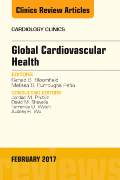
CARDIOLOGY CLINICS
Innovating cardiology with comprehensive reviews and expert analysis.CARDIOLOGY CLINICS is a prestigious journal published by W B SAUNDERS CO-ELSEVIER INC, offering insightful and comprehensive reviews in the field of cardiology and cardiovascular medicine since its inception in 1983. With its ISSN 0733-8651 and E-ISSN 1558-2264, the journal has established a significant impact factor within the academic community, holding a Q2 ranking in both Cardiology and Cardiovascular Medicine as well as in Medicine (miscellaneous) for 2023. Located in the heart of Philadelphia, USA, it serves as a vital resource for researchers, clinicians, and students seeking to deepen their understanding of cardiovascular diseases and advancements in treatment. Although it operates under a traditional subscription model, the journal remains committed to disseminating valuable knowledge that shapes current practices and informs future research directions. As it converges towards its 2024 issues, CARDIOLOGY CLINICS continues to play an influential role in enhancing the discourse on cardiovascular health worldwide, ensuring that its audience stays at the forefront of clinical and scientific developments.
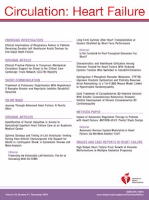
Circulation-Heart Failure
Elevating the standard of cardiovascular medicine.Welcome to Circulation-Heart Failure, a leading peer-reviewed journal published by Lippincott Williams & Wilkins dedicated to advancing the field of cardiac biology and clinical cardiology. With an impressive impact factor and ranked in the Q1 category both in Cardiology and Cardiovascular Medicine and in Medicine (miscellaneous), this journal stands out as a vital resource for researchers, clinicians, and students. Since its inception in 2008, Circulation-Heart Failure has been at the forefront of disseminating innovative research, expert reviews, and clinical practices related to heart failure and cardiovascular health. The journal, housed in the United States, is committed to fostering a deeper understanding of heart failure management, offering regular issues that converge comprehensive studies, cutting-edge clinical insights, and the latest advancements in therapeutic strategies. Engage with the latest findings and contribute to the dialogue in a journal recognized for its rigorous standards and significant contributions to the cardiology community.